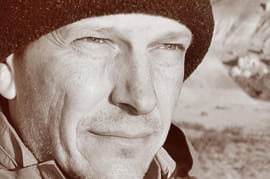What I'm Reading: Ken Lacovara

DrexelNow pulled Dr. Ken Lacovara, paleontologist and associate professor of biology in the College of Arts and Sciences, from his work in a marl pit in Gloucester County, NJ, to find out what he’s currently reading. He just finished The Map That Changed the World by Simon Winchester.
Why did you make this selection?
It had been on my reading list for a long while. It’s a pretty well-known book and Simon Winchester is a popular author among geologists. He writes with authority and uses the correct terminology.
What is it about this book/topic that you find important?
It’s a biography of a man named William Smith. Through his work as a surveyor, everywhere he went he collected fossils and took meticulous notes. At that time (early 1800s), the study of geology was in its infancy; it was a dilettante science. No one knew how old the Earth was or understood the meaning of fossils. Smith began using the fossils and rocks to correlate strata from one area to another to make maps of the underneath of England. He began to predict where certain strata would be found.
What I like about Smith is that he was the first one to seek answers through nature as opposed to philosophy. He was the first to show that if you’re going to make progress in understanding ancient life on Earth, there is no other way than to get into that trench or that pit, take a hammer and shovel and dig. Because that’s where the data are.
Up until 1815, when Smith published his map, people were living in a two-dimensional world—our view of the world at that point was like an amoeba sliding around on the surface of an egg. Smith gives us the third dimension—he gives us depth.
Did the book meet your expectations?
It did, very much so. I read another Simon Winchester book called The Atlantic earlier this year and that book was rambling. It was kind of a brain dump. This book was really coherent and put together well. It reminded me about why I wanted to be geologist in the first place.
Is there a passage/quote you find particularly interesting? Why?
I can’t choose a particular quote but Winchester posits in the book that geology is really foundational to all the other disciplines of science. After physics and chemistry, geology is the most fundamental science, but it was one of the last major sciences to develop. It’s because the data is so hard to get—it’s either under solid rock or in the ancient past, two places not easy to go.
In This Article
Drexel News is produced by
University Marketing and Communications.